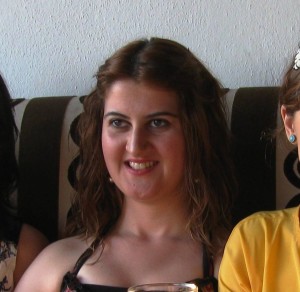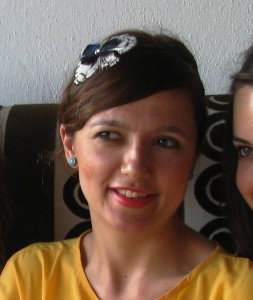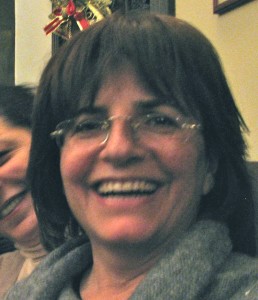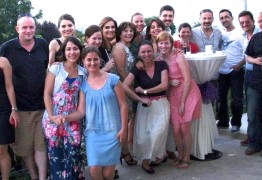“There are two kinds of relative clauses,” I began. “One is important for understanding the meaning of the sentence and the other is just extra information.”
I stood in front of my students explaining English sentences introduced by which, who, or that. As I wrote an example on the white board, three young men sitting beside the window began talking among themselves. Perhaps they didn’t understand what I was saying, and needed to discuss it.
I turned from the board and waited for them to stop, but they kept on. It now appeared that some kind of unrelated, amusing anecdote was being told. I moved a few paces toward the offenders, catching the eye of one of them. The rest of the class fell quiet. A truck rumbled by outside and the radiator hissed a blast of heat.
I remembered being caught talking in class in my student days. I would halt in mid-sentence, if not mid-word, my face scarlet. And I’d take care to be quiet during the rest of the period. But not these young men.
After a few more moments, all three looked up at me and finally fell silent. Great: I had made my point. I turned and walked back to the board. As I did, a conversation broke out in another part of the room.
What a difference a month had made! I was now so busy that I didn’t have time to question what I was doing here in Turkey or, most of the time, how I was doing it. On the home front, Sankar and I were enjoying a good stretch; most evenings we formed a companionable tableau: husband and wife sharing their workdays over dinner. Sankar was good at listening to my concerns and added office anecdotes to the mix as we tossed around our latest impressions of the Turkish culture. Our lackluster social life was no longer a problem; neither of us had the energy to care.
To my surprise, learning my students’ names had only taken a few days. I’d started with the easiest one on my list, Melike. The word means queen in Arabic, and I had guessed my student would be a young woman. Yes, and Melike was lovely, with wavy hair and big brown eyes. Another student on the list was named Onur, which sounded like Honor. It turned out I was right: onur is actually the Turkish word for honor. A rare cognate. The name seemed to fit this alert, blue-eyed young man.
As my students introduced themselves to me that first day, I scribbled hurried clues on my class list. “Curly hair.” “Tall and thin.” “Pudgy.” For one girl, “Looks like Kristen Wiig.” The first thoughts that popped into my mind, many were politically incorrect. One thin, goateed young man seemed furtive, unable to meet my eyes. “Al Q sleeper cell,” I jotted. But Orhan soon emerged as a class clown, and I found out he was the son of a NATO engineer. One day after class he confided, “We have mountains in Turkey that are hollow and full of NATO weapons.” Good to know.
The young women, fully half the students at this business- and engineering-focused university, were feminine and attractive, with long hair and the latest clothing styles. Particularly eye-catching were their boots, made of soft leather or fine suede in shiny browns and pale tans, and sometimes extending to mid-thigh. The young men looked older and more formidable than the men in the freshman English class I had taught in Minnesota. It was their coloring. Blond peach fuzz on the chin of a 19-year-old is barely visible, but a 5 o’clock shadow on a Turkish youth could turn him into a 30-year-old.
They hailed from cities and towns all over Turkey. Mardin, in the southeast, close to Syria, which in less than a month would erupt in civil war. Bursa, home to Ottoman sultans. Trabzon on the Black Sea, home of the mythical Amazons.
The School of English Language Instruction (SELI) was designed so that students could complete all five eight-week modules in one year. This seemed optimistic, and Sankar and I discussed it. Could either of us, motivated and undistracted by hormones, progress from zero to college level in a foreign language in just one year? We didn’t think so—even if we were totally immersed, which our students were not. There would simply be too much vocabulary to learn. The vast majority of OzU students couldn’t do this either: even the best ones failed a level once or twice, often taking two years to complete SELI. My level, Intermediate was considered the most difficult.
To reinforce grammar concepts, students completed a myriad of worksheets. These were designed by previous teachers and stored deep within the staff’s shared online “Z-drive.” It was great to have this resource, but the materials were often rife with mistakes. A typical example: “The teacher was busy taking the attendances.”
I loved my new colleagues — and have put pictures of some of them in this post, just so you can see how wonderful they are. I admired their near-mastery of English, in many cases accomplished with little or no time spent in English-speaking countries. And I knew it was hard to be corrected. But why weren’t we, the five or six native English speakers, tasked with vetting materials before they were put online?


I felt uneasy each time I got on the Z-drive to pull up materials. I could correct a worksheet and then save it to my own file; nobody would care. But what if I did a Save All—and I sometimes did, when I was feeling puckish—preserving my edits for everyone to access? My intuition warned that I might be overstepping a boundary. Would someone discover I had changed their work, and then reprimand me?
During the first few days, my students had been quiet and respectful, content to watch my PowerPoints and sit through diagnostic tests. On day two I got the chance to directly help a student when Talat, originally from a Kurdish town in the southeast, approached me during a break. How hard it must have been for him to form the words in English: “My family. . . is have . . . trouble. I don’t can buy the books,” came out in a whisper. I later learned that his mother had died when he was small, and that his father was only seasonally employed. I thanked Talat for telling me and went straight to Big Nergis.
“Tell him to come see me,” she suggested, and when he did, she loaned him a copy of the Intermediate textbook. The next day I purchased the supplementary book for 35 lira, about $20, and gave it to him.
By the end of the first week, my students’ behavior had begun to deteriorate. I started to notice murmuring that soon became a buzz of outright talking and occurred throughout the four hours I taught them. Most were attentive when I presented a new grammar concept, but whenever I told an anecdote, for example, about how a particular phrase was used in the U.S., or about my own strategies in learning a new language, they turned their faces from me, clearly uninterested. In a language class in which listening was key, the increasing noise was disruptive and worrisome.
Big Nergis believed in team teaching and so each of us had a teaching partner with whom, a couple of days each week, we switched classes. Although this added complexity to our jobs, it gave the students variety in accents and teaching styles.
During my first module, I teamed with Halime, a bright young woman who, like many of the SELI teachers, had graduated from large, prestigious Bilkent University in Ankara. As part of her training, she and several others now teaching at Ozyegin had been sent to Ames, Iowa, for several months to teach English literature to high school students. Caitlin and I laughed when we discovered that this had taken place during the winter months, and teased them that perhaps their “opportunity” had actually been a punishment. They laughed: the trip had had its challenges, most notably the freezing weather and lack of fresh produce, but they’d also spent time in both Chicago and New York.


Since I spent two days each week with Halime’s students, I had a whole new roster of names to learn—and students to shush. And the shushing was more difficult because these students treated me more like a substitute.
This rudeness, in an otherwise exquisitely polite culture, surprised me. I had been warned that 19-year-old Turks, sheltered and rarely given the chance to make their own decisions, might seem like 15-year old Americans. But I’d long had the impression that, while American students are exceedingly casual—putting their feet up, wearing pajamas to class, munching on snacks during lectures—the rest of the world’s students show their teachers great respect. Not so here.
My students’ inattentive behavior—and my uncertainty over how to manage it—made me feel less like a teacher. It reinforced my fear that I was merely an imposter. The students I was supposed to be helping were denying me the satisfaction of a job well done. I had never been treated in such an overtly dismissive way.
Observing Caitlin try to teach over student chatter just weeks before, I had vowed that I’d have a quiet class. Ah, the hubris of inexperience. I simply hadn’t imagined having this kind of discipline problem at the university level.

I tried to come up with reasons for the racket. I knew most of my students were living away from their parents’ control for the first time. They were trying to adjust to new freedoms and they wanted to make friends as quickly as possible. This led to a lot of socializing.
And the over-optimistic design of our program seemed to set students up for failure. Most were not particularly word-oriented in the first place, so they were bored by vocabulary and grammar lessons—and had little hope of success even if they did apply themselves. That made just about anything else in the room more interesting.
The physical setting was another culprit. Students sat in small chairs with desk arms that curved toward them, and their chairs were packed closely together along three sides of the room. The crowding, I felt, made everyone restless. The school had given each student a small Netbook laptop that they carried along with their textbook. That was too much for the tiny desk arms. After chatter, the most common sound in my classroom wasn’t tortured English pronunciation, but a sharp, slapping noise when a textbook or Netbook hit the floor. I couldn’t complain or ask for changes: the following year the entire university was moving to a brand new, multi-building campus some miles east.
Umit offered his take. “They study with money” he told me. ÖzU was not a public university; it was private. Here in Turkey, the general belief was that public university students, subject to more stringent entrance requirements and lower tuition, were disciplined, respectable scholars of modest means, while private university attendees were pampered, affluent brats. Upon hearing of my new teaching venue, every Turk I talked to made the same comment: “Oh, you have the spoiled kids.”
Back home, college students either went to a lecture intending to listen, or stayed away. They didn’t usually show up and disrupt the class. But here, students didn’t have the option of missing class: if they missed more than three days without excuse, they failed the entire module. To monitor this, I went down the class list making checks four times each day, at the beginning of every class period. This spawned resentment and a flurry of doctor’s excuses, causing me to joke about the “feeble health” of my students.
We were treating our students like children. “Why do we take attendance every hour?” I asked Little Nergis. She sighed, and replied that ÖzU had tried doing away with attendance, but that had resulted in students wandering in and out of classes at will.
I also wondered whether student anger might have also played a role. Anger at the lack of control they had as they were processed through the rigid Turkish educational system. After taking a grueling national exam during their senior year of high school, they were herded into universities based solely upon their scores; neither character, talent, nor other accomplishments were considered. And they were told to feel lucky if they gained a spot; a half million students were turned away each year due to lack of space. Once enrolled, students were expected to continue straight through to graduation. Semesters abroad or, heaven forbid, gap years, were viewed as frivolous, if not educationally fatal detours.
Hmm. . . anger over loss of control. Who felt this more acutely — my students or their teacher?
What could be done? In the past, Turkish teachers had apparently used corporal punishment, and national laws had recently been passed protecting students of all ages. The upshot was that teachers were legally forbidden from asking misbehaving students to leave the room. At ÖzU, all I could do was write up an “incident report” and send the offender to talk with Big Nergis after class, guaranteeing an even poorer attitude once the student returned.
One small tool I did have was the Classroom Participation Grade (CPG), an extra half-point awarded to each student each week for good behavior. This didn’t sound like much, but could total five points at the end of the module and mean the difference between passing and failing. Students that felt they had a chance of passing tried to earn that half point every week.
An ultimate tool, albeit of little immediate help was that students failing a module three times were generally asked to leave.
I also recognized that I had contributed to the problem. During my first weeks I had been too nice, too easygoing with my students. Now, it was difficult to shift to a sterner persona. I should have brushed away my tendency to defer to the culture as the guest I was, and started off assertively.
Two students got under my skin. One was Yildiz, pretty and dripping with disdain, and the other was Can, who actually had pretty good English speaking skills because of visits to the U.K., but spent class periods goofing around.
One day, after watching Yildiz turn again and again to her neighbor with an apparent joke while I spoke, I got angry. I yelled at her—probably for close to a minute—in English. I don’t recall exactly what I said, but it was something like, “Why can’t you listen? Why are you here if you’re not listening? (I already knew the answer to that.) As I went on, Can piped up with a rebuke, “She can’t understand you.”
My words silenced Yildiz, but what does the teacher do after she stops yelling? She turns toward the materials she was attempting to cover and tries to calm down enough to teach them, aware that she is now asking her students to focus and concentrate after she has done something unusual and upsetting.
The result? The miscreants could see that my rant had accomplished nothing; they could see that I had used up my arsenal, and so they paid even less attention . The others in class—the perhaps 2/3 who were not causing trouble? Well, this was an obedient and sociable society and these were nineteen-year-olds. They kept silent.
The only exception was an unusual young woman named Gül, rose. Tiny, with pale skin and relatively short dark hair, she never wore boots or up-to-date styles, but instead dressed in white Peter Pan blouses with print skirts, geeky white anklets and dainty old-fashioned tennis shoes. Every class period, she sneezed just once, but in an idiosyncratic squeak that quickly became humorous. She paid attention and didn’t hesitate to raise her hand when she had questions, which was often. Definitely her own person, Gül was liked by all. As the final exam neared and we began to review, she finally turned to the misbehavers and addressed them in her firmest voice, “Gerçekten!” Meaning, Really? You’re going to continue this kind of behavior even now?
In my first weeks, I had mentioned my talkative students to Turkish colleagues and they had nodded wearily. Yes, even experienced teachers admitted that their students were “chatty.” But I sensed it was worse for us foreigners, who couldn’t understand what the students were saying. In fact, there seemed to be a hierarchy of respect at ÖzU. The teachers who received the most deference were, not surprisingly, older, male, and Turkish. Those receiving the least were younger, female, and foreign. Caitlin fell into this category, and when several of us discussed this problem one day, she shared some half-serious advice. “Get the class to think you’re really cool, and then drop the ‘f’ bomb on them.”
The module continued relentlessly, the busy days blurring together. I kept putting one foot in front of the other, trusting that I’d eventually adjust to my role and surroundings. As the days and weeks wore on, lesson planning and answering diverse grammar questions became easier. I also learned something about Turkish culture, noticing that students who had colds constantly asked to be excused to the tuvalet. It turned out they wanted to blow their noses, something that Turks consider impolite in public. I now recalled Big Nergis’ unusual behavior with the tissue when she interviewed me.
I also conferred with Big Nergis. She told me that Turkish students were more likely to cooperate if they felt I had a personal interest in them. To help establish this, she told me, I should hold individual conferences early in the module. This was good advice, and I followed it in the subsequent modules I taught.
But for now, the constant noisy chatter continued. And, although the problem was often on my mind, I stopped mentioning it to my Turkish colleagues. It seemed an admission of my weak classroom management skills. I feared my students didn’t respect me; how could I invite disrespect among my colleagues as well? Thus I did the same thing the Turkish teachers did with their Achilles heel, English grammar. I buried it.

I had taken the job to feel better about myself, to grab hold of something that seemed, at least in my own country, increasingly scarce. To prove that I wasn’t old and washed up. I did feel a burst of pride whenever a new acquaintance asked me what I did, or when I told people back home that I’d managed to find a job in Turkey. And I felt satisfied when a day’s lesson went particularly well. But triumph and pride were nowhere to be found when I really needed them, hour after long hour in the classroom
By week five I had recovered enough self-possession to begin casting about for activities that might distract students from their socializing. Sometimes I succeeded. I played the song, “If I Had a Hammer” to illustrate the Second Conditional, and the students loved it, begging me to play it again and again. I put a series of grammar and vocabulary questions into a PowerPoint. Then, during our last period on Fridays, I divided the students into teams, gave them scratch paper for their answers, and got ready to keep score.
My male students were particularly thrilled. One team stood up, put their arms around each other in a huddle, and issued a fierce battle cry before I displayed the first sentence:
This is the car ______________ was in the accident.
- who
- that
- it
- he
As groups puzzled over the question, the guys kept busy yelling what they thought were wrong answers to other teams. The girls were quieter, content to provide much of the brainpower. The entire class fell silent–such bliss!—as I unfolded answer slips and delivered the verdict. When the game ended, such a roar came from the winning team that I was sure everyone on the floor heard us. From then on, last periods on Fridays were always reserved for games, and we all rallied together for at least one hour each week.
At the end of each day I walked outside to meet dear, familiar Ümit. He had complained about having little to do now that both Sankar and I were working, and I didn’t know how he occupied himself during the hours we were away. But he was prompt in picking me up at 4:30 each afternoon and had made friends with the ÖzU guards as well as a fruit and vegetable vendor across the street from the school.
When I emerged from the building, Ümit sprang out of the car, rounded the front to the right passenger side, opened the door with a flourish and stood smiling, waiting for me to get in. I had put up with that ever since I arrived in Turkey, but now I cringed. Several of my colleagues were coming out of the building a few paces behind me. Thankfully, they were busy talking to each other; I didn’t want them to see me getting into such a fancy car. Surely they would wonder why such a privileged person was working at all. I felt like a middle school student who is suddenly embarrassed at the existence of his parents.
I greeted Ümit and ducked quickly into the car, head down. Being “the rich American who rides around in a late-model BMW” was not the kind of relative clause I wanted to describe me.
Months later, however, I wondered whether it might possibly have garnered me more respect from my students.




